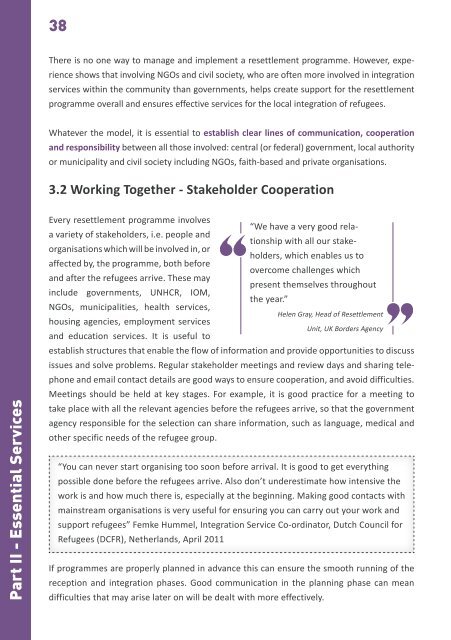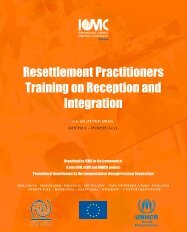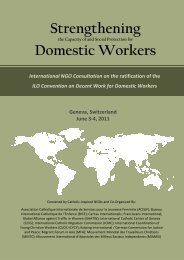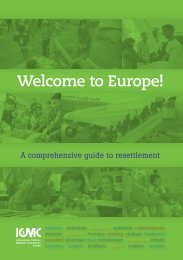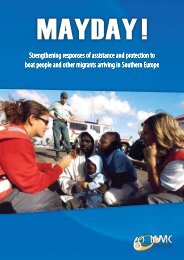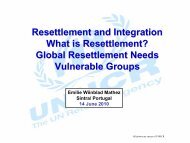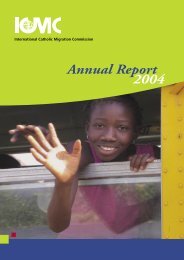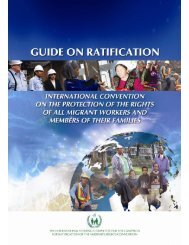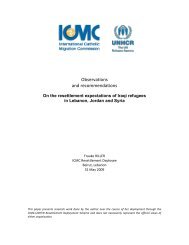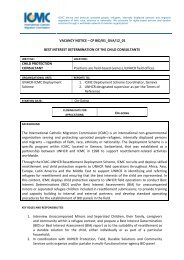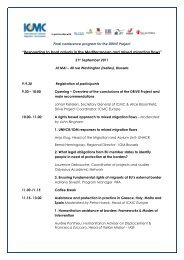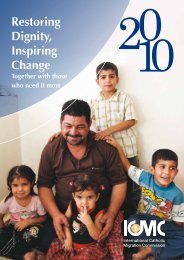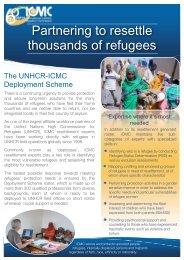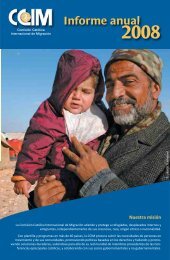'Paving the Way' Handbook - ICMC
'Paving the Way' Handbook - ICMC
'Paving the Way' Handbook - ICMC
You also want an ePaper? Increase the reach of your titles
YUMPU automatically turns print PDFs into web optimized ePapers that Google loves.
38<br />
There is no one way to manage and implement a resettlement programme. However, experience<br />
shows that involving NGOs and civil society, who are often more involved in integration<br />
services within <strong>the</strong> community than governments, helps create support for <strong>the</strong> resettlement<br />
programme overall and ensures effective services for <strong>the</strong> local integration of refugees.<br />
Whatever <strong>the</strong> model, it is essential to establish clear lines of communication, cooperation<br />
and responsibility between all those involved: central (or federal) government, local authority<br />
or municipality and civil society including NGOs, faith-based and private organisations.<br />
3.2 Working Toge<strong>the</strong>r - Stakeholder Cooperation<br />
Part II - Essential Services<br />
Every resettlement programme involves<br />
“We have a very good relationship<br />
with all our stake-<br />
a variety of stakeholders, i.e. people and<br />
organisations which will be involved in, or<br />
holders, which enables us to<br />
affected by, <strong>the</strong> programme, both before<br />
overcome challenges which<br />
and after <strong>the</strong> refugees arrive. These may<br />
present <strong>the</strong>mselves throughout<br />
include governments, UNHCR, IOM,<br />
<strong>the</strong> year.”<br />
NGOs, municipalities, health services,<br />
Helen Gray, Head of Resettlement<br />
housing agencies, employment services<br />
Unit, UK Borders Agency<br />
and education services. It is useful to<br />
establish structures that enable <strong>the</strong> flow of information and provide opportunities to discuss<br />
issues and solve problems. Regular stakeholder meetings and review days and sharing telephone<br />
and email contact details are good ways to ensure cooperation, and avoid difficulties.<br />
Meetings should be held at key stages. For example, it is good practice for a meeting to<br />
take place with all <strong>the</strong> relevant agencies before <strong>the</strong> refugees arrive, so that <strong>the</strong> government<br />
agency responsible for <strong>the</strong> selection can share information, such as language, medical and<br />
o<strong>the</strong>r specific needs of <strong>the</strong> refugee group.<br />
“You can never start organising too soon before arrival. It is good to get everything<br />
possible done before <strong>the</strong> refugees arrive. Also don’t underestimate how intensive <strong>the</strong><br />
work is and how much <strong>the</strong>re is, especially at <strong>the</strong> beginning. Making good contacts with<br />
mainstream organisations is very useful for ensuring you can carry out your work and<br />
support refugees” Femke Hummel, Integration Service Co-ordinator, Dutch Council for<br />
Refugees (DCFR), Ne<strong>the</strong>rlands, April 2011<br />
If programmes are properly planned in advance this can ensure <strong>the</strong> smooth running of <strong>the</strong><br />
reception and integration phases. Good communication in <strong>the</strong> planning phase can mean<br />
difficulties that may arise later on will be dealt with more effectively.


